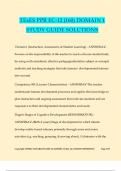Exam (elaborations)
TExES PPR EC-12 (160) DOMAIN 1 STUDY GUIDE SOLUTIONS
TExES PPR EC-12 (160) DOMAIN 1
STUDY GUIDE SOLUTIONS
Domain I (Instruction, Assessment, & Student Learning) - ANSWER-
Focuses on the responsibility of the teacher to reach a diverse student body
by using well-considered, effective pedagogical(relative subject or concept)
methods and teaching s...
[Show more]
Preview 3 out of 19 pages
Uploaded on
November 26, 2024
Number of pages
19
Written in
2024/2025
Type
Exam (elaborations)
Contains
Questions & answers
Institution
TEXES PPR
Module
TEXES PPR
£10.46
Also available in package deal from £120.61
100% satisfaction guarantee
Immediately available after payment
Both online and in PDF
No strings attached
Also available in package deal (1)
TEXES PPR Bundled Exams and Study Guides Questions and Answers 100% Pass Guaranteed.
£ 288.74
£ 120.61
28 items
1. Exam (elaborations) - Texes pedagogy and professional responsibilities ec-12 (160) exam practice questions ...
2. Exam (elaborations) - Texes ppr ec-12 (160) exam study guide solutions
3. Exam (elaborations) - Texes 160: ppr ec-12 exam study guide solutions
4. Exam (elaborations) - Texes ppr (160) bloom's taxonomy study guide solutions
5. Exam (elaborations) - Texes ppr ec-12 (160) domain 1 study guide solutions
6. Exam (elaborations) - Ppr, ppr texes 160, texes ppr concepts and terms study guide solutions
7. Exam (elaborations) - Texes ppr ec-12 #160 exam questions and answers 100% pass
8. Exam (elaborations) - Texes ppr ec-12 (160) study guide solutions
9. Exam (elaborations) - Texes: pedagogy & professional responsibilities (160) - vocab/terms study guide
10. Exam (elaborations) - Ec-12 ppr (160) exam practice questions with correct answers 100% pass
11. Exam (elaborations) - Texes ppr 160: domain 3 exam study guide
12. Exam (elaborations) - Texes pedagogy and professional responsibilities (ppr) (160) practice questions - pro...
13. Exam (elaborations) - Texes pedagogy and professional responsibilities (ppr) (160) practice questions - pos...
14. Exam (elaborations) - Ppr exam ec-12 160 notes updated 2024
15. Exam (elaborations) - Ppr exam 160 study guide solutions
16. Exam (elaborations) - Ppr (160) exam sample questions with correct answers
17. Exam (elaborations) - Texes pedagogy and professional responsibilities (ppr) (160) practice questions - ins...
18. Exam (elaborations) - Texes ppr ec-12 competencies (competency 1- 13) key terms study guide solutions
19. Exam (elaborations) - Texes - ppr competency 5 key terms study guide solutions
20. Exam (elaborations) - Ppr texes exam study guide solutions
21. Exam (elaborations) - Texes ppr (160) exam practice questions with correct answers 100% pass
22. Exam (elaborations) - Texes 160 ppr exam questions and answers 100% pass
23. Exam (elaborations) - Texes pedagogy and professional responsibilities ppr (160) exam study guide solutions
24. Exam (elaborations) - Texes pedagogy and professional responsibilities (ppr) exam study guide solutions
25. Exam (elaborations) - Pedagogy and professional responsibilities ec-12 (160) study guide solutions
26. Exam (elaborations) - Texes 160 practice test 1 questions and answers 100% pass
27. Exam (elaborations) - Texes ppr (160) practice questions with correct answers
28. Exam (elaborations) - Pedagogy and professional responsibilities (ppr) 160 study guide solutions
Show more
TExES PPR EC-12 (160) DOMAIN 1




